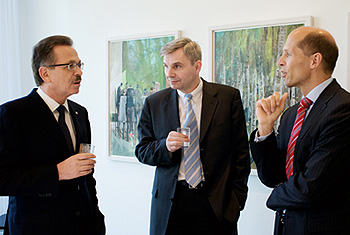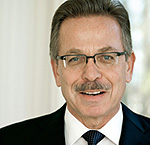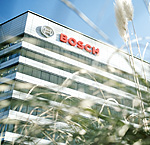Interview with Franz Fehrenbach, Robert Bosch
“Where there is no sense of belonging, money is far too highly rated as an incentive.”

1
In these difficult times, Franz Fehrenbach, chairman of the board of management of Robert Bosch GmbH, is making a conscious effort to build on the advantages of a mature, values-based corporate culture. In this interview with FOCUS, he explains why financial incentives do not play a dominant role in motivating senior executives at the world’s largest supplier of automotive technology.
Focus: Mr. Fehrenbach, Bosch is a privately-owned company with a distinctive values-based culture that has evolved over many decades. In the current crisis, what is the cumulative effect of values which your associates actually live by?
Franz Fehrenbach: More and more companies are realizing how important values are. It’s at times like these that their significance tends to become more obvious. That’s because values develop even greater power during difficult periods than they do in normal circumstances. But we shouldn’t kid ourselves – it takes time for values to develop, and for people to embrace and apply them in their daily work. Many people regard values as just another management fad. I recently read that corporate culture is expected to become “the most significant leadership technique in HR management”. When I read that, I asked myself: what do they really mean by ‘corporate culture’? People who think like this are doomed to failure; I am quite certain of it.
Focus: From our consultancy practice we know many companies that tackle this issue half-heartedly, simply because they underrate its importance. What advantages do companies like Bosch have with their strong, mature, values-based cultures?
Fehrenbach: We are often regarded as conservative. That was especially true in the heyday of the financial speculators and the shareholder-value movement. But our advantage is that we don’t confuse trends with genuine progress. We have a clear strategic alignment. And when we decide on a course of action, we stick to it. We don’t give up easily. These are our strong points. But we have to prove time and again that this is also what makes us successful.
Focus: Does the success of your company have anything to do with its ownership structure, where the Bosch family and a charitable foundation are its principal shareholders?
Fehrenbach: Yes, definitely. The family is now in its third generation, with Christof Bosch and Matthias Madelung still very much on board in various governance and supervisory roles. So the company has a human face and a heritage. Another important factor is that Bosch CEOs don’t change every five years. In other words, the company is strongly defined and represented by specific people. This helps our associates to easily identify with the company and its senior management team. They feel they’re in good hands.
Focus: When employees don’t have this sense of belonging, what are companies doing wrong?
Fehrenbach: In many companies that fail to generate such a sense, money is far too highly rated as an incentive. In my view, money is here today, gone tomorrow.
Focus: What are the primary values at Bosch, and isn’t it true to say that they are also subject to change?
Fehrenbach: Many of our values, insights, and principles can be traced right back to Robert Bosch. These are old, established values like credibility, reliability, and legality. We have re-emphasized their significance to highlight our sense of corporate and social responsibility. But in the late nineties, we took a good hard look at our system of values and asked: which of these are still valid? What other precepts should we adopt to modernize our company and equip it to respond to the challenges of the future? It was a very intense process. The board of management spent weekends and public holidays in retreat sessions, discussing these matters in depth. But as a result of this joint learning process, each one of my boardroom colleagues radiates pride, even today, when he talks about our code of values. In my view, their conviction and enthusiasm is extremely important. Of course there were skeptics who warned us not to put our values in writing, because then we could be measured against them. But that’s precisely what we wanted – that was the whole point of the exercise.
“Our focus on results is about securing the company’s future over the long term.”
Focus: And what were the most significant changes compared with the company’s original maxims?
Fehrenbach: It is no coincidence that we now give priority to an approach that focuses on the future and on results. By that, we don’t mean making the largest possible profits in the shortest possible time. Our focus on results is about securing the company’s future over the long term. This is much more difficult than simply maximizing short-term profits. We’re looking for long-term, lasting success. That’s the entrepreneurial challenge we have set ourselves.
Focus: In recent years, you have expanded into new areas, growing on a global scale. Has this international growth had an impact on your code of values?
Fehrenbach: Well, now that we employ some 280,000 people around the world, centralized management is no longer really feasible. To a very large extent, therefore, we must rely on our associates to act on their own initiative and to show determination in pursuing our objectives. This is is why we rate initiative and determination so highly on the Bosch scale of values. It was clear to us that we had to create smaller operating units and drive forward the idea of entrepreneurial thinking. A value shift of that kind is not something that happens overnight: across the Group as a whole, we still haven’t achieved the total consistency we’re looking for.
Focus: This cultural transformation at Bosch is clearly something that matters very much to you.
Fehrenbach: Yes, you could say that. As I mentioned earlier, this transformation was already underway by the late nineties. Within the board of management, there was a core team of people who loved the idea and drove it forward. And I was one of them. Back in the eighties, I was already concerned that we were very oriented to technology, and not enough to our customers. Responsiveness wasn’t something that was valued back then. Then, in the nineties, my predecessor Hermann Scholl began to pick up on the feedback we were getting from our customers. His motto was: “we’re making the change.” I then drove the matter forward and added my own strengths to the mix.
Focus: Where do you see your strengths?
Fehrenbach: In particular, I give a very high priority to communication. Bosch used to be very much reserved in its PR activities. Nowadays we satisfy the need for internal and external communication in a very different way. For me, the threefold combination of communication, values, and credibility is vitally important.
“This passion that drives me is something I always want to convey to associates.”
Focus: You left school in 1968. How did this transformative era influence your attitudes, your work, and your management style?
Fehrenbach: As a young man, I was extremely critical of big business. But when I joined Bosch, I soon identified completely with the company. The thing that convinced me was the way the company distributed profits – I found myself wanting to do well and contribute to the company’s success. HR specialists would call this “intrinsic motivation”. This conviction, this passion that drives me is something I always want to convey to associates. I think it’s one of the key elements in answering the question: how does Franz Fehrenbach define leadership? For me, leadership is very much about convincing and inspiring other people, and about the best ways to do that.
Focus: Are you succeeding in infusing your values and convictions into your workforce worldwide?
Fehrenbach: Every two years we carry out a worldwide associate survey. It covers issues like the Bosch values-based culture, the company’s goals, our strategy. The results of the last survey impressed me very much. Even overseas, the response rate was more than 80 percent. And our associates overseas showed enormous interest in the question of values. Both in and outside Germany, more than 80 percent of those taking part in the survey told us they were proud to work for Bosch. That has reinforced my belief that our corporate culture is also being put into practice in other parts of the world. It is rated just as highly there as it is in Germany.
Focus: How do you actually go about transferring the Bosch values to emerging countries like India or China?
Fehrenbach: That is indeed one of the hardest tasks of all, and of course the board of management must set an example. Whenever we visit one of our sites, we organize a big town-hall meeting. The advantage of this approach is that we can reach a lot of people at once, but of course there is still a relatively large distance separating us from individual associates. So we have developed a second communication channel which we call a dialog forum. Whenever we visit a site, the first 25 associates to register can sit down with the board member at what amounts to a round table discussion. This allows an intensive exchange of ideas.
Focus: In the transfer of Bosch values, what role is played by German managers working in other countries?
Fehrenbach: They play an absolutely vital role. Specialists and executives who have grown up in Germany and know how Bosch ticks must be prepared to work in the emerging countries and act as opinion leaders. We expect this mobility as a matter of course. At the present time, we have more than 2,500 Bosch associates working outside their home countries, and these people are not only Germans.
Focus: As things stand now, some 60 percent of your workforce is based outside Germany. In view of this, is Bosch still a German company, or is it really a multinational corporation?
Fehrenbach: We’ve been a multinational corporation for a long time now. But we will always retain our German roots and acknowledge them with pride. In some markets, for example, legality is a sensitive issue. But we do not tolerate any compromises. All our activities are in line with the letter of the law.
Focus: Is it true that your managers are more loyal to the company than the industry average?
Fehrenbach: Yes, it is: in Germany, our turnover at department head level and above is less than one percent. In China and India things are a little different, since managers there are generally more inclined to change jobs. But even there, we still come off a lot better than the industry average. In other words, in Germany and elsewhere we’re clearly more successful than other companies at retaining our management personnel.
Focus: So how do you motivate your managers, then?
Fehrenbach: Alongside their well-developed intrinsic motivation – also indicated by the very low turnover rates I’ve just mentioned – our leadership style plays a significant role. Being dependable and predictable – these are the important things, as well as providing clear guidelines within which our managers have plenty of freedom to act. Our leadership principles provide the necessary framework for all this.
Focus: To date, Bosch has never recruited external executives for top management positions. Could that change in the future?
Fehrenbach: I wouldn’t like to exclude it categorically, but the learning curve for an outsider would be very steep. That’s because we have a special culture, one you need to live in and experience for a long time before you feel comfortable with it. So I would say: yes, we need to bring in fresh blood, but not necessarily at top management level. I think it would be more appropriate at middle to upper management level. Managers should have the opportunity to enjoy a couple of years of personal growth and make sure they’re right for Bosch.
Focus: How is your corporate culture reflected in the salary structure at Bosch?
Fehrenbach: You may be amazed to hear this, but in 34 years of working at Bosch, I personally have never asked for a raise. I know I’m not alone in this – there are plenty of other examples. Our associates and executives know their compensation is fair. At Bosch, financial incentives don’t play a dominant role. Other factors are more important, for example the support Bosch provides for career advancement, or for finding the right balance between work and family life.
Focus: But to attract top talent, surely you have to provide some financial incentives? How does compensation at Bosch compare with other companies in the industry?
Fehrenbach: Our non-exempt associates are paid according to the collective bargaining agreement negotiated with the IG Metall labor union, whereas managers and executives are paid in line with market standards. And as our comparisons with other companies show, they do very well. But among our junior and senior executives alike, compensation isn’t really an issue. At the same time, the higher you rise up the Bosch hierarchy, the greater the gap between you and the top earners in the industry. Measured against publicly traded companies, board members at Bosch are right down at the bottom end of the spectrum. But, I can assure you that none of my colleagues is thinking about changing jobs just because they could earn more elsewhere. They know how special their company is, and they can live well on their salaries. What’s more, I’ve never heard our works council complain that managers are paid too much at Bosch!
Focus: In more detail, what makes the reward culture at Bosch special? To what extent does sustainability play a role here?
Fehrenbach: Our principle is: fair pay for good performance. That means basic pay in line with market standards plus an appropriate variable component based on performance and results. We use this system worldwide, and we regularly review it. As far as basic income is concerned, each year we check our compensation levels against international market norms and make any necessary adjustments. Maintaining an evenhanded balance between the different internal income brackets is also an important part of this process, so that the overall structure is perceived to be fair.
We have different ways of calculating the variable income component: over the short term it is based on the extent to which managers have achieved their agreed goals over the budget year, but our top managers, numbering about 350, also receive a long-term bonus based on rates of return for the operating units they are responsible for. The goals for these rates of return are derived from external benchmarks and are set for a rolling three-year period. This system is applied worldwide. It is measured against short-term and long-term corporate objectives, and prevents mis-management of the kind we’ve seen all too often in the business world over the past few years.
Focus: At many large corporations, the situation is totally different. Salaries in the eight-figure range, together with high bonus payouts in the banking sector, have aroused widespread public criticism. Have things gotten out of hand? Do we need to reflect on the importance of common sense?
Fehrenbach: In the banking sector that’s quite probably true, and it seems to me that the relevant compensation models have never really been examined in the necessary detail. Instead we’re arguing about whether the state should regulate managerial salaries in Germany. I think it would be much better if the banks got together and developed suitable compensation and incentive schemes, and then undertook to adhere to them within a binding, self-regulatory framework. As I see it, many recent mistakes can be traced back to a gap between the proclaiming of values and the willingness to live by them, especially at senior management level.
Focus: Shouldn’t companies like Bosch get more involved in the debate and perhaps also approach politicians?
Fehrenbach: We’ve already made our position clear. For example, last year I addressed a meeting of the CDU Council of Economic Advisers in Berlin, and introduced our business model. That was when I realized just how intensively politicians are examining these issues. But businesspeople are beginning to change their attitudes as well, and I have great faith in the younger generation. Recently I gave a lecture to 500 students studying business administration in Munich, and quoted one of Robert Bosch’s sayings, dating from 1921: “In the long term, an honest and fair approach to doing business will always be the most profitable.” The students broke into spontaneous applause! But the necessary transformation is likely to take a while to happen, since so many large companies are finding it difficult to change their cultures for the better.
“Values develop even greater power during difficult periods than they do in normal circumstances.”
Focus: During the first five years of your chairmanship, Bosch has been very successful: sales and earnings have both increased substantially. According to your projections, sales are to reach 75 billion euros by 2012. Is this goal still attainable in the light of the current crisis?
Fehrenbach: No, we won’t reach our goal, since the economic crisis means our sales growth will remain weak until at least the beginning of 2010. As soon as things have stabilized, however, we will still be aiming to achieve a target annual growth rate of eight percent. We came up with a figure of 75 billion euros by projecting the growth rate based on this target benchmark. We are hoping to achieve two-thirds of it through organic growth, and the remaining third through acquisitions and opening up new markets. We’ve stated that we must grow faster than the market as a whole, since that’s the only way to improve our competitive position.
Focus: How are you dealing with the crisis? What cost cuts are you planning?
Fehrenbach: We want to get through this without making any drastic personnel cuts. In Germany especially, I am confident we can achieve this thanks to our flexible working-time schemes. In general terms, we have to perform a tricky balancing act between cost reductions on the one hand and vital investments for the future on the other.
Focus: So you’re not planning to cut costs by reducing your high R&D expenditure?
Fehrenbach: Last year we spent some eight percent of sales on R&D; in the Automotive Technology sector it was even 12 percent. That is a high figure, it is true, and we want to maintain it this year. We’re not scrimping on investments for the future. The same goes for occupational training. This year we shall continue to run our programs at full capacity, training more than 6,000 young people worldwide.
Focus: How are you communicating your plans, targets, and potential cuts in view of the crisis?
Fehrenbach: Especially in difficult times, credible communication is absolutely essential. It’s about looking facts in the face and accepting the situation for what it is. At the same time, it’s important to build confidence. Only then can the team generate peak performance. Internal communication plays a particularly crucial role at this time, and we’re not cutting back on that. On the contrary, we’ll be intensifying our communication activities there, just as we have been over the past few years.

Franz Fehrenbach was interviewed in Stuttgart by Jörg Ritter (center) from Egon Zehnder in Berlin and Heiko Wolters from Egon Zehnder in Stuttgart.
RESUMÉ Franz Fehrenbach

Franz Fehrenbach was born on July 1, 1949, in Kenzingen (Breisgau), Germany. After taking his Abitur (school-leaving exam) in 1968, he studied industrial engineering at the University of Karlsruhe and was awarded his degree in 1975. In the same year, he started work at Robert Bosch GmbH as a trainee.
He went on to become head of materials planning and logistics at the alternator plant in Stuttgart-Feuerbach (1978). He then worked as commercial plant manager at the company’s Hildesheim plant (1980) before becoming vice-president at the corporate department for planning and controlling (1982). In 1985 he transferred to the U.S., where he was appointed vice-president finance and administration at the Automotive Group of Robert Bosch Corporation and executive vice-president in 1988. In 1989 he returned to Germany and worked as a senior executive in various divisions before being appointed to the Bosch board of management, first as a deputy member in 1999, then as a full member in 2001. On July 1, 2003, he succeeded Hermann Scholl as chairman of the Bosch board of management. He is only the sixth person to head the company in its 123-year history.
Franz Fehrenbach is regarded as conciliatory in manner, but hard as nails in business, especially when pursuing corporate earnings targets. Under his leadership, the formerly reserved company has made the transition to a policy of open internal and external communications. Franz Fehrenbach is married and has three adult sons.
ROBERT BOSCH GMBH - From spark plugs to security systems to solar collectors

In 1886 Robert Bosch (1861–1942) opened his “Workshop for Precision Mechanics and Electrical Engineering” in Stuttgart with only two associates. Today the Bosch Group is a multinational corporation and the world’s largest supplier of automotive technology. In 2008 the Group employed some 280,000 people, of whom 40 percent are based in Germany, and generated sales of more than 45 billion euros. The Group comprises more than 300 subsidiaries and regional companies in over 60 countries.
The largest business sector at Bosch, accounting for some 60 percent of sales, is Automotive Technology, followed by the Industrial Technology business sector (for automation and packaging technology), and the Consumer Goods and Building Technology business sector. Increasingly, Bosch is also moving into the renewable energy sector (heat pumps, wind power, and solar energy). Growth in this sector and others will mean that Automotive Technology’s share of sales will fall to 50 percent over the medium term.
During the first five years under Franz Fehrenbach’s leadership, Bosch made impressive progress. Sales climbed from 35 billion to roughly 46 billion euros, and pre-tax profits doubled to eight percent. But even Bosch has been affected by the present global economic crisis: for the first time since 1945, the company is expecting to make a loss in the current financial year.
PHOTOS: RÜDIGER NEHMZOW





